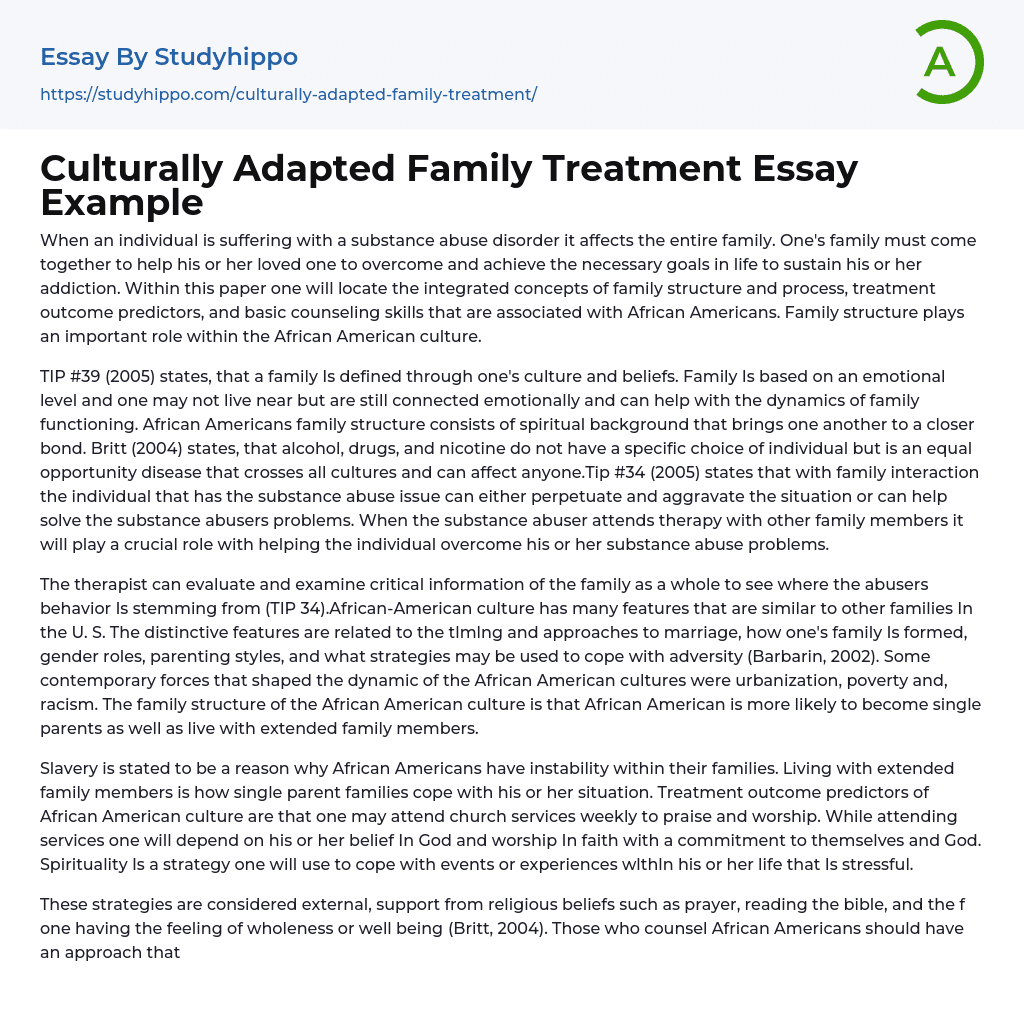When someone experiences a substance abuse disorder, it has implications for their entire family. To help their loved one overcome and manage their addiction, the family must collaborate. This paper covers the interrelated topics of family structure and process, predictors of treatment outcomes, and counseling skills specific to African Americans. In African American culture, family structure holds significant value.
According to TIP #39 (2005), family is defined by culture and beliefs and based on emotional connections, which can still exist even if family members live far apart. African American families in particular have a strong spiritual background that binds them together. Britt (2004) notes that substance abuse affects people regardless of culture, race, or gender. TIP #34 (2005) suggests that a substance abuser's family interaction can either worsen or improve the situation. Family therapy can play a crucial role in helping the individual overcome substance abuse pro
...blems.
As per TIP 34, the therapist can assess and scrutinize significant details concerning the entire family to identify the underlying cause of the abuser's conduct. The African-American community shares similar qualities with other American families while also possessing distinct attributes connected to marriage, family creation, gender roles, nurturing techniques, and approaches to coping during difficult times (Barbarin, 2002). Modern influences like urbanization, financial hardship, and discrimination have impacted the dynamics of African-American society. Within this culture, it is more common for single parenthood and extended family living arrangements among African Americans.
Instability within African American families can be attributed to slavery, resulting in extended family members living together to cope with single parenting situations. In African American culture, attending weekly church services is a treatment outcome predictor, where individuals rely on
their belief in God and worship with a commitment to themselves and God. Spirituality is a coping strategy used by African Americans to manage stressful life events or experiences.
According to Britt (2004), certain external strategies, such as prayer, reading the bible, and feeling whole or well, are seen as supportive through religious beliefs. When counseling African Americans, it is important to have a culturally sensitive approach as their socioeconomics play a crucial role in substance abuse situations. Poverty, limited job opportunities, illiteracy, poor education, high drug availability, and everyday stressors in their lifestyle are among the many reasons African Americans may experience substance abuse issues.
According to Britt (2004), the numerous liquor stores present in African American communities have a greater influence on the population's alcohol consumption. Additionally, Boyd-Franklin (2003) emphasizes the importance of family psychologists avoiding stereotyping when working with African American families who are impacted by issues such as crime, violence, drugs, and homelessness. To best assist these families, therapists must have a comprehensive understanding of the intersecting social class and racial issues affecting African Americans. Due to anti-spiritual beliefs, African Americans may be hesitant to trust therapists or undergo counseling. The therapist should work to build trust by meeting with the entire family, particularly in cases where family therapy is required (Boyd-Franklin, 2003).
African American families can benefit from counseling if they trust their therapist and if any concerns or fears are addressed. However, they may still have reservations about counseling even if their therapist shares their cultural background. Conversely, they may find it difficult to work with a therapist who comes from a different cultural background. African Americans can be critical of
their own lives or circumstances and will expect to be respected before opening up to a therapist. It is important for therapists to ask families if they are comfortable working with someone from a different cultural background and to create opportunities for discussing race in counseling sessions (Boyd-Franklin, 2003).
Today's society, workplace, and family impose twice as many challenges on African American women due to the intersection of racism and sexism. Additionally, these women often exhibit remarkable strength and may assume the role of caregiver in the event that an African American man is unable to secure employment. Nonetheless, power struggles are common in couples facing this issue, and therapists may observe significant anger during counseling sessions.
According to Boyd-Franklin (2003), therapists must acknowledge and avoid enforcing societal gender norms to prevent further complications. Additionally, African American culture often turns to spiritual beliefs and reliance on God for support in matters such as substance abuse or daily struggles. Family members can also assist those coping with substance abuse issues. Therapy may benefit individuals seeking help.
Reference https://www.ncbi.nlm.nih.gov/books/NBK64953/
- Abuse Support essays
- Child Abuse essays
- Alcohol Abuse essays
- Physical Abuse essays
- Sexual Abuse essays
- Substance Abuse essays
- Home essays
- Dog essays
- Adoption essays
- Babies essays
- Children essays
- Love essays
- Parenting Teens essays
- Wedding essays
- Wife essays
- Aunt essays
- Daughter essays
- Parents essays
- Sister essays
- Foster Care essays
- Sibling essays
- Father essays
- Grandparent essays
- Mother essays
- Caring essays
- Dysfunctional Family essays
- Bedroom essays
- Room essays
- Relationship essays
- Jealousy essays
- Friends essays
- Online Dating essays
- Divorce essays
- Husband essays
- Marriage essays
- Hometown essays
- Parenting essays
- Family Tradition essays
- Family Values essays
- Baby Clothes essays
- Child essays
- Childcare essays
- Child labor essays
- Doll essays
- Walls essays
- Appreciation essays
- Single Parent essays
- Single Parenting essays
- Abortion essays
- Abuse essays




